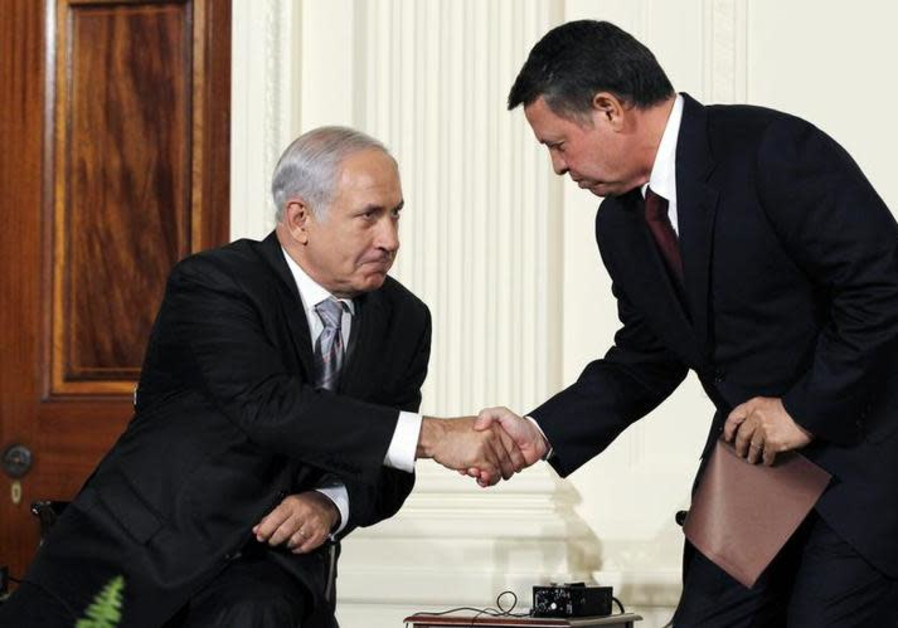Analysis
Jordan’s king sends signal to Netanyahu: ‘We want our lands back’
King Abdullah of Jordan took Israelis by surprise this weekend when he declined to renew a portion of the 1994 peace treaty between the neighboring countries, which grants Israel the right to lease two Jordanian lands.

Uraib al Rantawi, a columnist for the Amman daily Al Dostour, told me it’s not quite accurate to say King Abdullah of Jordan has “succumbed to the pressures of demonstrators.” Rather, “it is more accurate to say that he listened to his people, as a good head of state does.”
This is Rantawi’s explanation for the decision of the Hashemite monarchy not to renew a part of the annex to the 1994 peace treaty with Israel that was set to expire next year. This move was announced by the Jordanian sovereign on Sunday, and apparently took Israel by surprise. The goal, the king said, was to restore the “full sovereignty” of the Hashemite Kingdom over its territories, as opposed to “leasing” them to Israel for another 25 years.
“Jordan is working within the framework of the peace treaty, so the criticism that has come from Israel makes no sense,” Rantawi said. “Our country wants to regain control over portions of its territory that had been temporarily leased to Israel. After all, this is in accordance with the wishes of the people,” Rantawi added, referring to the public letter signed by 86 MPs (out of a total of 130), professional bodies, associations, political parties and ordinary people on social media, in a campaign that started a year before the expiration of the leasing agreement and that called on the king not to renew this particular annex to the treaty with Israel signed 25 years ago by King Hussein, the father of King Abdullah.
At issue are two agricultural areas on the border between the two countries. The first, at Baqura (600 hectares), is located near the Sea of Galilee. The second, at Ghamr (400 hectares), is located toward the south, in the Negev desert. Israel had occupied and cultivated these areas after the 1967 war. Later, on signing the peace treaty in 1994, Israel acknowledged the exclusive sovereignty of Jordan over the two areas, while in return King Hussein offered them the possibility to lease them for a period of 25 years, with automatic renewal for another 25 years unless one of the parties were to inform the other that they wanted to terminate the agreement. The deadline to do so was Oct. 25, 2018.
Israel never seriously considered the possibility that Jordan, a country with which it has a close security relationship and common strategic interests, was planning to terminate the deal. One assumes that the Netanyahu government had to have known something, though. It is hard to believe that the Israeli intelligence services were completely in the dark about Jordan’s intentions. What is certain is that dozens of Israeli farmers were caught completely unawares, and now they have to give up hundreds of hectares of agricultural land.
Netanyahu tried to put a positive spin on the incident and gave assurances that negotiations would be initiated with Jordan to try to agree on an extension of the existing deal. However, Israeli commentators tended to explain this development in light of the current relations between the two countries. They emphasized that it resulted partly from popular anger against Israel’s policies toward the Palestinians. This was on clear display during last Friday’s demonstration in Amman, when many participants were calling not only for reclaiming sovereignty over the Ghamr and Baqura lands, but even for withdrawing from the treaty with Israel altogether.
But, says the analyst Mouin Rabbani, “there is much more behind this decision [by King Abdullah]. Amman has sent a clear signal to Israel and the US: they do not accept that Netanyahu and Trump alone should dictate the rules of the game. [King Abdullah] signaled he does not agree with the American peace plan for the Middle East, nor does he welcome Saudi Arabia having set its sights on the Temple Mount in Jerusalem, something Israel is rumored to have unofficially agreed to.
“Most importantly,” Rabbani said, “the king gave a signal that he was dismayed by the Netanyahu government’s policies aiming at the destruction of the two-state solution, which Jordan believes to be essential for its stability.” At the same time, Rabbani emphasizes that “Amman will maintain a cautious approach, as it is too dependent on US aid to think about confronting Trump and Netanyahu head-on.”
Originally published at https://ilmanifesto.it/re-abdallah-alza-la-voce-con-netanyahu-rivogliamo-i-nostri-territori/ on 2018-10-24
